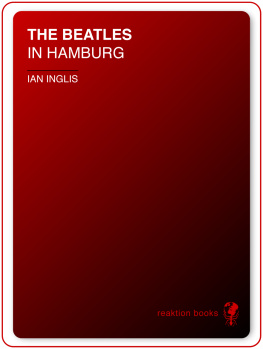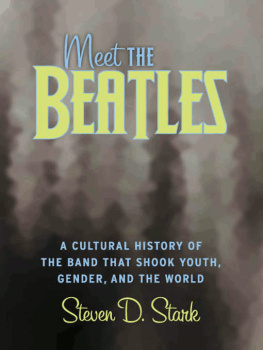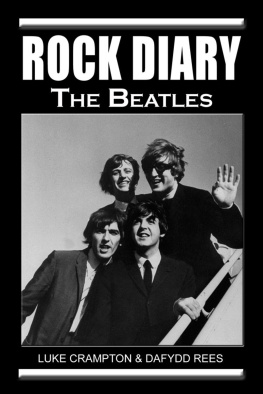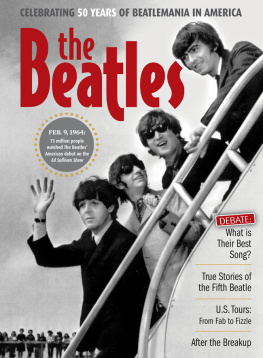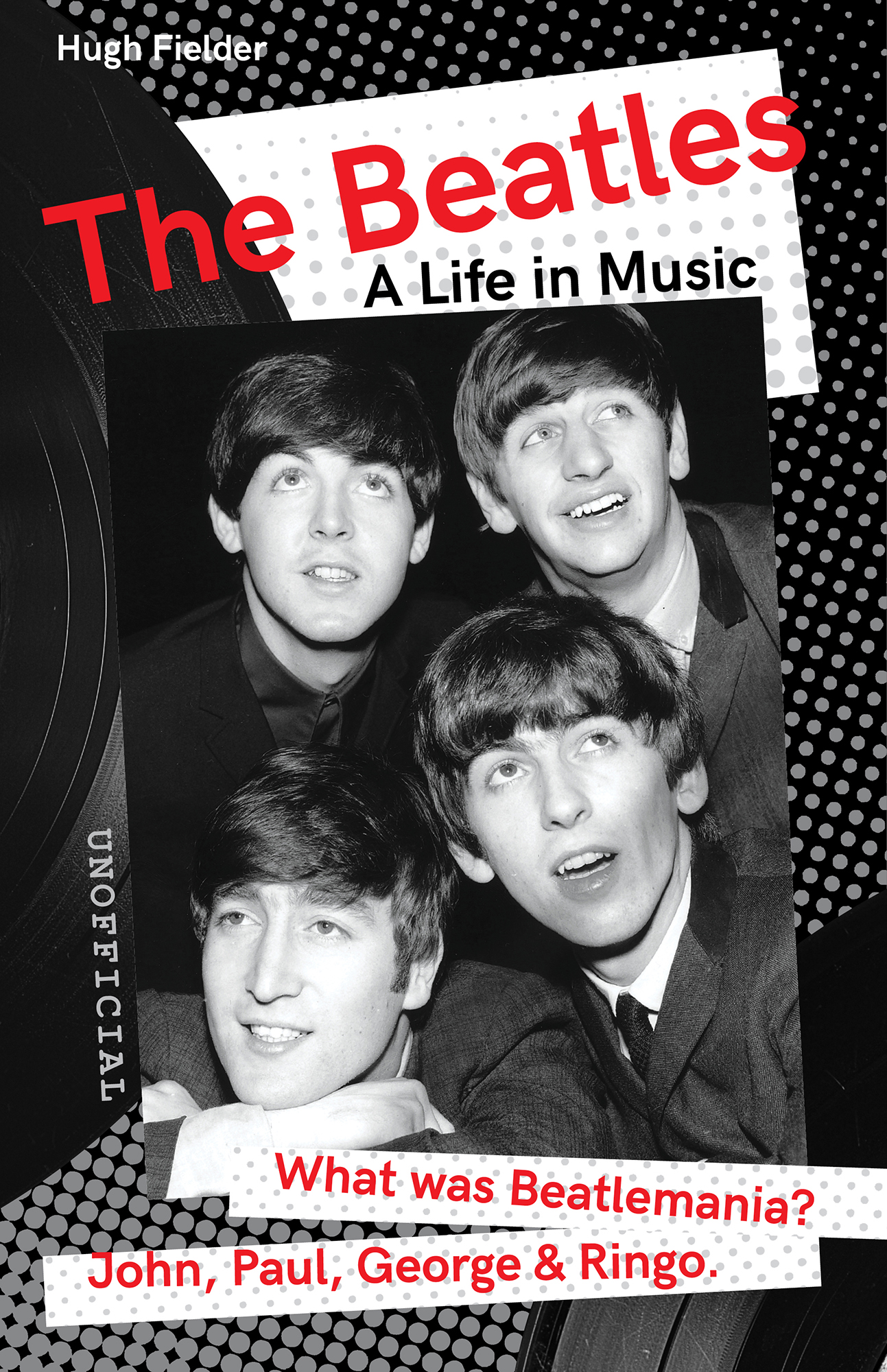THE BEATLES
A Life in Music
HUGH FIELDER
Foreword: Tony Bramwell
WHAT WAS BEATLEMANIA?
John, Paul, George & Ringo
UNOFFICIAL
FLAME TREE
London & New York
Foreword
I first became friends with George Harrison in 1953. We lived close to each other and used to play Cowboys and Indians and other games that were allowed at the time I still have a scar on my neck from a misfired arrow!
George was learning guitar and would come around to my house and learn songs from my familys record collection. I lost touch with him for a while, but met him again on a bus, when we were both headed to a dance at Litherland Town Hall. He was in a band playing there and I asked if I could carry his guitar so I could get in for free. I was astonished to see he was in this group called The Beatles, alongside Paul McCartney and John Lennon, two boys whom I also knew. They were so good and so exciting to see perform. I continued meeting up with them and carrying things until Brian Epstein became their manager and he asked me to work for him and The Beatles, which I did for their entire career.
The Beatles are still the most respected and lauded of any musicians and entertainers. Reissues of their recordings in new formats outsell most contemporary releases and open the group up to new audiences all the time. But, having known them from the very beginning, and having attended most of their shows over the years, I remember them most fondly as the little rock band they were before the world recognized them as The Fab Four or The Mop Tops. Nowadays, I find it fun to attend some of the tribute festivals, which attract thousands of people, and relive The Beatles experience all over again.
Tony Bramwell
Record promoter and former CEO of Apple Records
Four Ways The Beatles Changed The World
If it hadnt been for The Beatles, there wouldnt be anyone like us around.
Jimmy Page, Led Zeppelin
T he Beatles were the first band to write all their hits. They changed the course of popular music history and the record industry. There are many ways they were revolutionary, but take these four for starters
They Revolutionized Pop Music
Their songs were influenced by the American rocknroll they had been playing in the clubs of Liverpool, as well as Hamburg where they served their apprenticeship, along with emerging pop trends like Tamla Motown. They added their own individual and immediately identifiable style, however, which struck with a teenage generation looking for something they could call their own resulting in a frenzied enthusiasm. The media called it Beatlemania.
They Opened The Flood Gates
In the wake of The Beatles first flush of success, a host of other British bands jumped aboard the bandwagon. Liverpool bands in particular were tumbling over themselves Gerry and the Pacemakers, The Searchers, Billy J. Kramer and the Swinging Blue Jeans. Out of London came The Rolling Stones, The Who, The Kinks, Small Faces, Manfred Mann and The Yardbirds. And it spread The Spencer Davis Group from Birmingham, The Hollies from Manchester, The Animals from Newcastle, Them from Belfast Behind them were dozens more. Some even got lucky with a hit written by Lennon and McCartney.
They Conquered America
No British act had ever succeeded in America before The Beatles. EMIs US subsidiary Capitol Records didnt even bother to release their early records, but once they scored a No. 1 with I Want to Hold Your Hand, early in 1964, the speed at which The Beatles dominated the charts remains unsurpassed. At the beginning of April, they occupied all top five positions of the Billboard Hot 100. Their first American TV performance on The Ed Sullivan Show in February 1964 had a world record 73 million audience. For many US rock stars of the late-1960s and 1970s, that show was a pivotal moment in their career.
They Stayed Ahead Of The Game
Despite some lively competition, The Beatles remained ahead of the pack throughout their career. After their early pop phase so prolific they were handing out songs to other bands like confetti they pioneered the switch towards more reflective lyrics and sophisticated songwriting. They embodied the spirit of 1967 with their masterpiece Sgt. Peppers Lonely Hearts Club Band . They were at the front of the rollercoaster ride through the rest of the 1960s and although the end was inevitably messy, when they split up early in 1970, it really was the end of an era.
Im a melody freak and they were the masters.
Billy Joel
195759: Thatll Be The Day
The Beatles were the Mozart of popular music. No one ever equalled their extraordinary output between 1963 and 1970.
Tim Rice
T he Beatles Richard Starkey (Ringo Starr, born 7 July 1940), John Winston Lennon (9 October 1940), James Paul McCartney (18 June 1942) and George Harrison (24 February 1943) were wartime babies, who were born and grew up in 1950s Liverpool, a major port that was still recovering from the bomb damage of the Second World War. They all moved house at least once as the city was rebuilt.
Meet The Beatles
McCartney and Harrison met as teenagers riding the same bus home from school, bonding over a shared love of skiffle, the latest pop craze to sweep Britain. McCartney met Lennon, who had formed a skiffle band called the Quarry Men, when they played a garden fete on 6 July 1957. He successfully auditioned for the band playing Eddie Cochrans Twenty Flight Rock on Lennons guitar (upside down because he was left handed) and impressed Lennon by knowing all the words. Harrison was still only 14 and had to wait until his 15th birthday in February 1958 before he could join.
From Quarry Men To Moondogs
Although they recorded their first demo in the summer of 1958 a cover of Buddy Hollys Thatll Be The Day and a McCartney/Harrison song called In Spite Of All The Danger the Quarry Men, with Harrison on lead guitar and Lennon and McCartney playing rhythm, struggled to get gigs and hit a hiatus in early 1959 after Lennons mother was killed by a speeding car (hed never known his sailor father). But Lennon and McCartney hung out together and started writing songs, including One After 909 that would show up on The Beatles final album, Let It Be , in 1970.
They resumed gigging later in the year without a bass player and with a succession of drummers (several of whom were driven away by Lennons vicious temper), but they still managed to progress to the final of the Star Search competition in Manchester under the name Johnny & The Moondogs. Unfortunately, they ducked out of their final spot to catch the last train back to Liverpool.
1960: Ill Never Dance With Another
We cant read music, sorry we can play the Harry Lime Cha-Cha which weve arranged ourselves
Paul McCartney
A t the beginning of 1960, Lennon persuaded his art-school mate Stuart Sutcliffe to join the band on bass. He arrived with a stylish Hofner bass (that he couldnt actually play) and a new name for the band The Beetles. This was soon expanded to The Silver Beetles by their first manager, Alan Williams, who got them gigs on the rough n tough local dancehall circuit, a Scottish tour backing fellow Liverpool singer Johnny Gentle and a job providing the accompaniment for a stripper called Janice at an illegal strip club hed opened.



